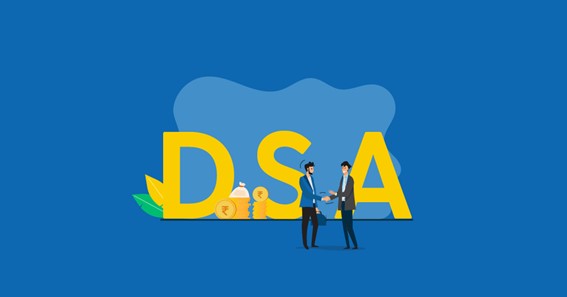Are you curious to know what is DSA in banking? You have come to the right place as I am going to tell you everything about DSA in banking in a very simple explanation. Without further discussion let’s begin to know what is DSA in banking?
What Is DSA In Banking?
In the dynamic world of banking and finance, various terms and acronyms are used to describe different roles and functions. One such term is DSA, which stands for Direct Selling Agent. In this blog post, we will delve into what DSA in banking means, their role in the industry, and the impact they have on the lending landscape. Join us as we demystify DSA and explore its significance in the banking sector.
What Is DSA?
DSA, or Direct Selling Agent, is an individual or entity authorized by a bank or financial institution to act as an intermediary between the institution and potential customers. DSAs play a vital role in marketing and selling various financial products and services offered by the bank, primarily focusing on loan products such as personal loans, home loans, or credit cards.
Role And Responsibilities Of DSAs In Banking
- Customer Acquisition: The primary responsibility of a DSA is to acquire new customers for the bank by promoting and selling the bank’s financial products. DSAs actively reach out to potential customers, educate them about the available products, assist with the application process, and facilitate the documentation required for loan approvals.
- Relationship Management: DSAs act as the bridge between the bank and the customer throughout the lending process. They establish and maintain relationships with customers, addressing their queries, providing updates on loan applications, and ensuring a smooth customer experience.
- Market Intelligence: As they interact directly with customers, DSAs gain valuable insights into market trends, customer preferences, and competition. They provide feedback to the bank, helping them refine their product offerings and marketing strategies.
- Compliance and Documentation: DSAs are responsible for ensuring that all necessary documentation and compliance requirements are met during the loan application and approval process. They help customers understand the documentation requirements and assist them in completing the necessary paperwork accurately.
Impact Of DSAs In The Banking Sector
- Expanding Customer Reach: DSAs play a significant role in reaching out to a wider customer base. Their active involvement enables banks to tap into new markets and customer segments, expanding their lending business.
- Speed and Efficiency: With DSAs acting as intermediaries, the loan application and approval process can be expedited, leading to faster loan disbursal. DSAs streamline the documentation process, reducing the time and effort required from both customers and the bank.
- Market Penetration: DSAs contribute to the bank’s market penetration by leveraging their network and expertise. They utilize their understanding of local markets and customer preferences to tailor product offerings and increase market share.
- Customer Convenience: DSAs provide personalized and localized assistance to customers, making the loan application process more convenient. Their presence in local communities allows customers to have face-to-face interactions and seek guidance throughout the process.
Conclusion:
DSA, or Direct Selling Agent, is a crucial component of the banking industry, serving as an intermediary between banks and potential customers. Their role in customer acquisition, relationship management, market intelligence, and compliance significantly impacts the lending landscape. DSAs help banks expand their customer reach, enhance operational efficiency, penetrate new markets, and provide personalized customer experiences. Understanding the role and impact of DSAs in banking sheds light on the dynamics of loan acquisition and the efforts made to cater to diverse customer needs.
FAQ
Is Bank DSA Profitable?
Yes, the DSA business is profitable completely based on the monthly returns generated by an individual.
Who Is Eligible For DSA Bank?
you don’t need to hold a degree in banking or finance. Any salaried or non-salaried individual can apply to be a DSA loan agent. You need to be above 18 years of age. You need to be an Indian citizen.
How Can I Become DSA In Sbi?
To become an SBI DSA, you have to go to their official website and fill out their SBI bank DSA registration form online. After you fill in your personal and financial details, they will evaluate your profile. If you match their eligibility criteria, you will be called in for an interview.
How Much Commission Does DSA Get From Banks?
On average, a DSA receives up to 1 percent as commission for materializing a business or personal loan amounting to ₹ 10 Lakh. The DSA payout rate is higher if the loan amount sought is more. 1.50% is offered for ₹ 30 Lakh and 2.00% for over ₹ 50 Lakh.
I Have Covered All The Following Queries And Topics In The Above Article
What Is The Meaning Of DSA In Banking Sector
What Is DSA And Dma In Banking
What Is The Meaning Of DSA In Banking?
Bank DSA Commission
DSA Full Form In Sales
DSA Loan Agent Registration
Navi Loan DSA Partner Registration
DSA Payout Structure
Axis Bank DSA Commission
Loan DSA Franchise
Nbfc DSA Registration Online
What Is DSA In Banking
What is the meaning of DSA in finance
What is the work of DSA in bank
